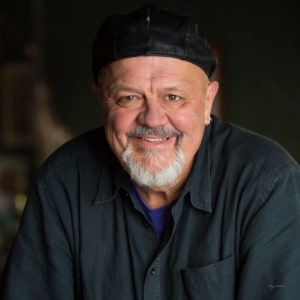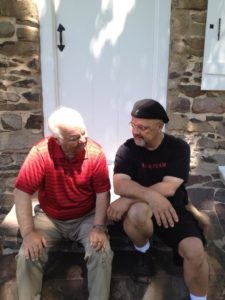“Your father has had a stroke. We are on our way to the hospital.”
The text message came from my mother, just as I was finishing a worship service at a youth camp in the mountains of Arkansas. The next morning, as we prepared to leave, I looked at my friend Darren, who was the youth minister at the church, and said, “I have to go and say goodbye to my father,” as though I understood what I was saying.

Milton Brasher-Cunningham
The next few weeks moved both quickly and in slow motion. I came down the mountain and went to the barren and boiling expanse that is Waco, Texas, where my parents lived. Dad was himself, except he sounded like some strange creature had taken control of his voice box. I went home to North Carolina, and Dad moved to rehab. Within two weeks, I was back in Texas because he had taken another turn. Looking back, I think he had a stroke no one detected. Within another fortnight, we moved from rehab to hospice to funeral, and before long, back to the routines of life that left my mother, my brother, and me in three different cities.
What I didn’t understand
After the funeral, my first inclination was to call my friends whose fathers had died before mine, and say: “I’m sorry. I meant well. I had no idea this is what it felt like.”
I understood something I had not before: Although the weight and depth of grief felt new to me, they were not new. I had seen them in others, but I had not been able to understand. Now I did.
I thought the sorrow I felt was reserved for those who had known a parent-child relationship that was a lifetime of joy, and not for those of us who had endured periods of struggle and distance. I felt lost. I went looking for words to name the absence I had not felt before. I read any account I could find of someone’s journey with grief. I wanted metaphors for the ache that I felt. I wanted stories. I wanted specifics. I wanted to know I was not alone.
John Berger wrote about going into the studio of a friend after his funeral: “The studio seemed to be like a bakery, the ovens still warm, from which the baker had just walked out to go down to the river.”
Dad’s absence had a presence, an aroma, a sense of who was missing.
Missing (adj.): absent from a place, especially home, and of unknown whereabouts.

The author with his father, Milton Cunningham.
Although I can remember his voice and his laugh — I still hear them — I can’t talk to him about baseball, or books, or his lunch at The Real Deal, his favorite restaurant in Waco. He is not here, and I don’t know where they have taken him.
The books I did not find helpful were those that described how to get over the grief, as if it were an obstacle. Somehow, I knew that grief was not something I was going to conquer or shed like a bad habit.
My friend Patty, whose parents died many years before mine, told me grief was “something we learn to move around in.” That made sense. I was going to live the rest of my life without my dad. I was going to live the rest of my life moving around in grief. Whatever else happened, that circumstance would not change. What could change was my perspective.
I am stating the obvious, I suppose, when I say experiences of grief alter the way we look at life. When we lose the people we love — or the places, jobs, hopes — we have to look at life differently because life is different. There is a before and an after. The world is not the same, so we can no longer look at it in the same way.
Life was not perfect
Life with my father was not perfect. We lived through several stretches where it was difficult for both of us. I was his namesake, which often made things even more complicated. When we were living in Boston, I went back to Baylor University for homecoming and learned that my father had preached that day on campus. I did not hear the sermon, but a friend told me that he had used me as an illustration. My father said: “In life you have to learn the difference between a problem and a predicament. A problem you can fix. A predicament is something you have to learn to live with.” He paused. “I used to think my eldest son was a problem. Now I see he is a predicament.”
I told that story at his funeral, and then I said, “I learned he was a predicament, too.”
We had worked hard to learn to live with and love each other as we were, which was a good thing. While we were both still alive, we found a rhythm that let us both be ourselves and be together. After his death, that connection meant my ongoing predicament was that I was not going to get over missing him. And I didn’t want to.
The stories of learning to live with grief that have mattered to me have honored the absence. I have listened hard to the personal accounts that made room for resonance. Their voices sang the ancient melody I could feel aching in my heart. Although what I was feeling was unfamiliar, the books I read and the conversations I had made me realize I was walking well-travelled roads, which was both comforting and disquieting. I had landed on populated shores. I had not discovered anything new.
What I’m learning through grief
Like many of us, as a kid I was told that in 1492, Columbus sailed the ocean blue and discovered America. He may have made the voyage, and even found a land that was not on his map, but the verb is wrong. He did not find a place that no one else had seen; he landed on a populated shore. He landed in the middle of someone else’s story. He set foot where people had lived for generations, where cultures and kingdoms already had come and gone. He learned. He found, perhaps. He became aware of. He explored. He condescended. But he didn’t discover a thing.
Neither have I, other than to say that in the course of my life I have discovered some things about myself, although most of those were already apparent to people around me, so even here my choice of verb is tenuous. More often than not, I feel like Mark, Ray Kinsella’s brother-in-law in the movie Field of Dreams, who was fiercely opposed to Ray’s plowing under his corn to build the baseball diamond on his farm, until he saw Doc Graham step off the field to save his niece’s life. All of a sudden, where he had once seen nothing but an empty ball field, he saw a diamond teeming with players.
Not many months passed before I relinquished my title as the last of those I knew whose father had died, and I became one of those a little farther down the road. I sat with a newly fatherless friend over coffee and talked about a metaphor I had found meaningful.
“I’m learning that grief is a primary color,” I said. “It’s not something other than life; it is at the core of it all.”
Excerpted from The Color of Together: Mixed Metaphors of Connectedness by Milton Brasher-Cunningham. Used by permission of Light Messages Publishing.
Milton Brasher-Cunningham was born in Texas, grew up in Africa, and has spent the last 30 years in New England and North Carolina. He is an ordained minister in the United Church of Christ and has worked as a high school English teacher, a professional chef, a trainer for Apple, and is now an editor. He is the author of three books, Keeping the Feast: Metaphors for the Meal, This Must Be the Place: Reflections on Home, and his latest, The Color of Together. He loves the Boston Red Sox, his mini schnauzers, handmade music, and feeding people. He lives in Guilford, Conn., with Ginger, his wife, and their three Schnauzers. He writes regularly at donteatalone.com.


